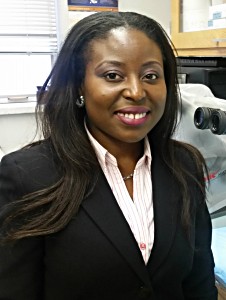
Efeturi Oghenekaro Ph.D., a 2015 graduate of the doctoral program in Marine and Environmental Sciences at the University of Maryland Eastern Shore, is current serving a one-year term as a NOAA Sea Grant Knauss Marine Science Policy Fellow. Dr. Oghenekaro started her fellowship earlier this year and took time to reflect on her work thus far, which is shared below.
1. How is your fellowship going so far?
Life as a Knauss Fellow is a great professional experience. The fellowship has given me exposure to a variety of programs within the National Oceanic and Atmospheric Administration’s (NOAA) Office of Oceanic and Atmospheric Research (OAR), International Activities Office, created networking opportunities within and outside the agency, and even with foreign research partners.
2. What type of work are you doing?
As part of my portfolio, I assist with the management of a program that supports the bilateral relationships between the United States and Canada; the trilateral agreement between the United States, Canada and the European Union (Galway Statement on Atlantic Ocean Cooperation); and also the Intergovernmental Oceanographic Commission (IOC), which has connections to Africa. In regard to the IOC, which is a science arm of United Nations Educational, Scientific and Cultural Organization (UNESCO), I am currently reviewing the African priorities in relation to the UNESCO IOC mission and looking for potential areas where the United States can consider capacity building related to ocean observations and climate change science. My work could also include Cuba, if interest in ocean science collaboration is prioritized.
Through my work in the Office of International Affairs, I meet people who are involved in the formulation and implementation of science policies which have global impacts. I had the honor of meeting the Irish Prime Minister, Enda Kenny (Acting Taoiseach) during the last St. Patrick’s Day reception in Washington, D.C. because of my involvement with the Galway trilateral partnership. Simply put, being a Knauss Fellow opens doors! The fellowship is prestigious and has a great reputation.
3. Will your work relate to your doctoral research at UMES in any way? If so, how?
Directly – No; indirectly – YES, because it all involves marine science. My dissertation research focused on how environmental factors, both abiotic (temperature, salinity, pH, D.O.) and biotic (phytoplankton composition and biomass, abundance of mysids and bay anchovy) influenced zooplankton dynamics in the Maryland Coastal Bays. I hope to meet people at NOAA who are playing leading roles in the nation and international marine ecosystem program. My strong background in marine, estuarine and environmental sciences has enabled me understand the research that NOAA scientists are doing. I am able to relay this information to the non-scientific audience members that formulate and implement science policies. In the end, my job revolves around marine science topics and principles; the strong marine science training I received at UMES definitely comes in handy.
4. What are you hoping to gain from this experience as a Knauss Fellow?
I hope to strengthen my networking skills, make connections, and gain useful contacts within agencies that are of interest to me professionally; learn more about the UN, intergovernmental organizations, and the international components of NOAA programs. I would like to get an understanding of how federal agencies function, in particular the formulation and implementation of marine science policies. I also hope to gain experience managing science collaborations involving international partners.
5. How did your experience at UMES (and as part of the CREST center) benefit your academic and professional career?
My education at UMES prepared me for this fellowship, which currently serves as a launch pad for my professional career. As a graduate student at the NSF CREST-CISCEP Center at UMES, I was able to achieve my dream of earning a doctoral degree in Marine and Environmental Sciences. The NSF CREST Center funded part of my graduate education and fully funded my dissertation research. It provided me with opportunities to partake in outreach and capacity building activities, engage in professional development training and scientific meetings within and outside the United States.
It is important to state that it was during the 2014 NOAA EPP MSI biennial meeting, hosted by UMES NOAA LMRCSC, that I learned more about the Knauss Fellowship and decided to apply for it.

